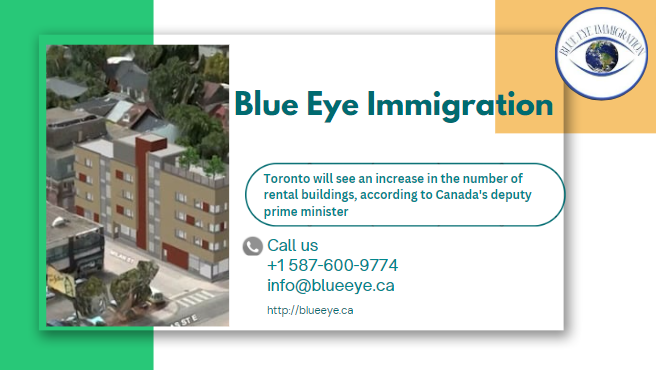In an effort to alleviate the nation’s housing issue, Canada’s Department of Finance announced this week that the federal government will be investing an additional $1.2 billion to construct new rental houses in Toronto.
According to a news release dated November 14, this funding would be “provided as fully repayable low-interest loans through the Rental Construction Financing Initiative [RCFI]” and allocated among “seven new projects in Toronto.”
The funds will assist in the construction of 2,644 new rental dwellings in the city, according to the statement made jointly by Attorney General/Minister of Justice Arif Virani and Deputy Prime Minister Chrystia Freeland of Canada.
Note: Of all the provinces and territories in Canada, Ontario, the province that is home to the city of Toronto, is the top destination for immigrants. Since Toronto is the largest city in Ontario, visitors to Canada may find this statement to be significant. Later in this post, I’ll go into more detail on how this announcement—as well as others made in subsequent months and years—has affected immigrants.
According to the press release, Canada’s RCFI “is on track to create more than 71,000 new rental housing units across Canada by 2027–2028,” demonstrating the government’s understanding of the importance of giving Canadians alternatives for rental housing.
“Building stronger and more vibrant communities that Canadians can be proud to call home requires increasing the overall supply of rental housing.”
This is the most recent of several initiatives from the Canadian government at all levels to address the challenges in housing affordability and availability that are now affecting Canadians nationwide.
A summary of some of Canada’s further initiatives to address and resolve this issue nationwide is provided below.
Canada’s further initiatives to alleviate the housing problem in the nation
The announcement was made by the Ontario government on November 1st, 2018, regarding the removal of the entire provincial amount of Harmonized Sales Tax (HST) on newly constructed rental housing. This includes apartment buildings, student housing, and senior residences that are specifically designed for long-term rental accommodations.
Note: Residential construction projects in the province must meet specific requirements in order to be eligible for what the government of Ontario is referring to as a “enhanced rebate.” One of the requirements is that the project must have started “construction between September 14, 2023, and December 31, 2030 [while completing] construction by December 31, 2035.”
To find out more about this Ontario-based HST effort, see this link.
Along with the announcement of the rental housing investment in Toronto last week, the federal government also unveiled a number of additional programs aimed at “building more homes… and making homes more affordable for Canadians.”
That list contains the following items:
- Under the Affordable Housing and Grocery Act, new rental housing would not be subject to the Goods and Services Tax (GST).
The Housing Accelerator Fund, worth $4 billion - In order “to ensure that houses are used as homes for Canadians to live in, rather than as financial assets for foreign investors,” non-resident, non-Canadian buyers of residential real estate are prohibited from doing so for two years.
- To give first-time homebuyers up to $1,500 in direct assistance, the First-Time Home Buyers’ Tax Credit has been doubled.
- “Providing $1.5 billion to create 5,200 new affordable housing units for Canadians in severe housing need” is the announcement of the third phase of the Rapid Housing Initiative.
- “Offering low-income renters a $500 payment to assist with housing costs in December 2022 as a top-up to the Canada Housing Benefit.”
Implications for Immigrants to Canada
Particular to Ontario, the most popular destination for newcomers out of all Canadian provinces and territories, these latest changes signify significant efforts being made to guarantee that all newcomers to this nation, including foreign workers, international students, and permanent residents, can easily assimilate into Canadian society.
Without a doubt, housing plays a big role in what it means to live comfortably in Canada. Having a place to live can make it much simpler to raise a family and devote more time and energy to one’s studies or career, whether one is a new temporary or permanent resident.
Moreover, it is common for newcomers to Ontario and Canada as a whole to rent a property rather than own one when they first move here.
Therefore, while Canada strives to address the nation’s housing challenges, announcements and measures like the Affordable Housing and Groceries Act (see above) and the latest one made by Ontario’s Deputy Prime Minister demonstrate that immigrants are being given serious consideration.
Click here to learn more about renting a house as a new immigrant to Canada. In the meanwhile, this dedicated webpage is useful if you would want to learn more about purchasing a property in Canada.
